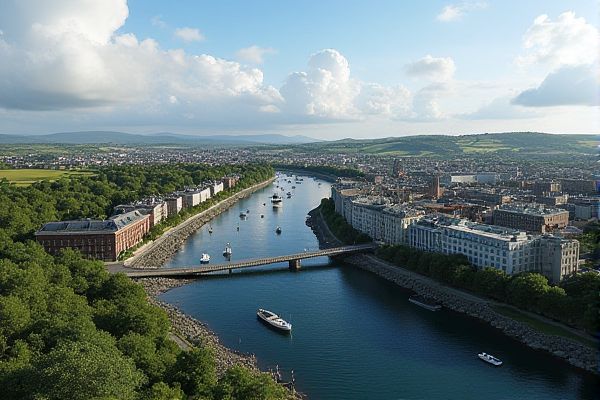
Cost of living in Ireland: Rent prices. Grocery costs. Utility expenses. Transportation fees. Health insurance costs. Education fees. Dining out prices. Entertainment costs. Tax rates. Salary expectations.
Rent prices
In the second quarter of 2024, the average residential rent in Ireland exhibited noticeable variations across different counties. Dublin stood out with the highest average rent at EUR2,377 per month in the city center. This contrasts sharply with Leitrim, which offered the most affordable option at EUR1,139 per month. Interestingly, most counties experienced double-digit annual increases in rental costs. For a detailed breakdown of these statistics, visit the detailed report on Average Residential Rent in Ireland.
Grocery costs
In Ireland, the cost of groceries varies, with prices such as EUR1.30 for 1 liter of regular milk, EUR1.81 for a 500g loaf of fresh white bread, EUR1.62 for 1kg of white rice, and EUR2.54 for 1kg of apples. For more detailed information, you can explore the Numbeo Food Prices website. The daily recommended minimum amount of money for food per person is approximately EUR9.16, translating to a monthly minimum of EUR283.93.
Utility expenses
In Ireland, utility expenses for a two-bedroom apartment can range from EUR100 to EUR200 per month. These expenses typically cover electricity, which can cost between EUR50 and EUR120, water expenses ranging from EUR20 to EUR45, and waste management costing between EUR5 and EUR15. Additionally, television and internet services often fall within the EUR20 to EUR50 range. These costs can vary significantly based on usage and provider specifications. For more detailed information about these expenses and other cost implications, you can visit the Edvoy website for comprehensive insights.
Transportation fees
Traveling through Ireland can offer a range of transportation options to fit various budgets. If you're considering renting a car, anticipate costs around EUR150 per day, with petrol prices ranging from EUR1.40 to EUR1.65 per litre. Taxis typically start at a fare of EUR3.50, with an additional charge of EUR1.50 per kilometer. For those opting for public transportation, bus rides generally cost between EUR2 and EUR3, while train ticket prices vary. Although public transport is more affordable, it is important to note that its availability can be limited, especially in rural areas. For more detailed insights, you can explore the [Overland Ireland Tours blog](https://overlandirelandtours.com/blog/what-is-the-cost-of-a-trip-to-ireland/) which offers comprehensive information on planning a cost-effective trip across the country.
Health insurance costs
In Ireland, health insurance costs can differ widely based on the type and extent of cover you choose. For families, a comprehensive private health insurance plan covering two adults over 26 and two children can be fairly substantial. On the other hand, an individual over 26 may find themselves paying a considerable annual amount for a private health plan. The expenses have been escalating, largely attributed to healthcare inflation and the rising costs of claims. To delve deeper into the nuances of healthcare expenditures for expats, you can refer to more insights on the MoveHub website, where detailed guidance is offered.
Education fees
The Cost Of Education In Ireland varies significantly depending on the course and university. Undergraduate courses typically range from EUR10,000 to EUR25,000 per year, postgraduate courses from EUR9,950 to EUR35,000 per year, and specialized courses like MBA and MBBS can cost between EUR20,000 to EUR40,659 per year. For more detailed information, you can explore the website on Leverage Edu which provides insights on the expenses expected while pursuing higher education in Ireland.
Dining out prices
Dining out in Ireland offers a diverse range of options, from an economical meal at an inexpensive restaurant priced around EUR18, to a three-course meal for two at a mid-range restaurant costing approximately EUR80. For those preferring a quick bite, a McDonald's combo meal is available for EUR9.80. If you enjoy a pint of beer, expect to pay between EUR3.20 and EUR5.60, while a meal in a pub typically ranges from EUR15 to EUR25. The costs can vary significantly based on the location and the type of establishment. For more detailed insights on living expenses in Ireland, visit the Cost of Living section on the Numbeo website.
Entertainment costs
The average daily cost for visiting attractions and entertainment in Ireland is approximately EUR20 Euros, with varying costs for different activities and tourist attractions. This budget allows travelers to explore the country's rich cultural heritage, including historical sites, museums, and various entertainment options. For more detailed information and budget planning, travelers can visit the Exiap Guide to ensure a well-planned and enjoyable experience throughout their stay in Ireland.
Tax rates
In Ireland, the standard income tax rate is 20% up to a certain threshold, such as EUR42,000 for single individuals, and any income above this threshold is taxed at a higher rate of 40%. Corporation tax rates vary, with a standard rate of 12.5% for trading income and a higher rate of 25% for passive income. Moreover, a global minimum effective rate of 15% is applied for in-scope businesses under the OECD Two Pillar agreement. For more details, visit the Income Tax Rates page.
Salary expectations
Living comfortably in Ireland generally demands an annual salary ranging from EUR50,000 to EUR70,000. However, in urban centers such as Dublin, where living expenses are considerably steeper, you might find that salaries need to be between EUR60,000 to EUR80,000 or even higher. For more details on expenses and lifestyle expectations in these regions, you can explore the comprehensive guide available at Raisin Ireland, which provides valuable insights into the financial requirements for maintaining a desirable standard of living in the country.
